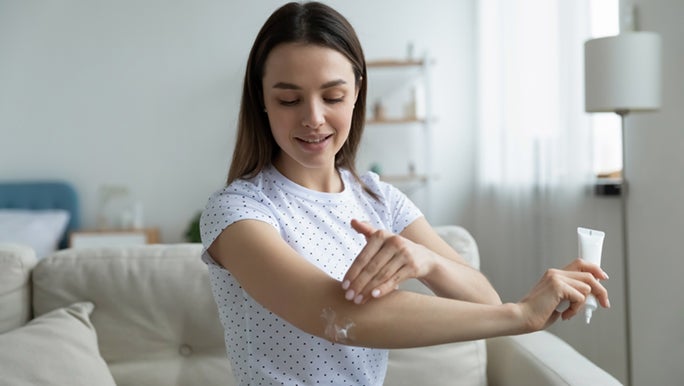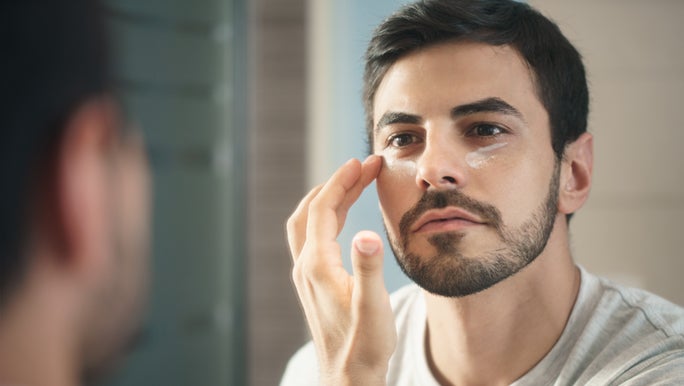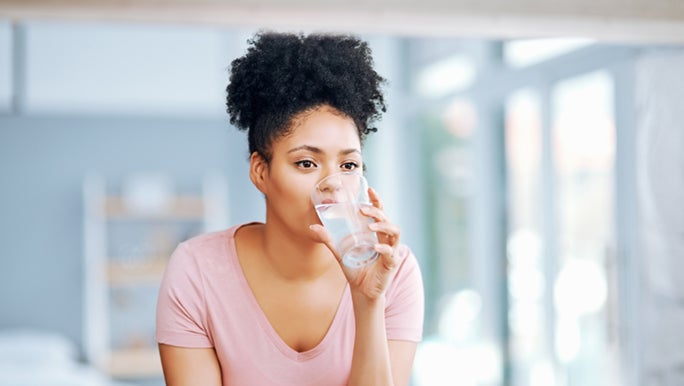Does my skin need some hydration?

Key Points
- ‘Dehydrated skin’ and ‘dry skin’ are two different things, although one can affect the other.
- Drinking more water is only likely to hydrate your skin if your body is generally dehydrated overall.
- Using the right moisturiser may help with both dry and dehydrated skin.
Did you know that dehydration can make your skin look dry?
If you answered ‘yes’, and you’re wondering why your skin’s so dry, you might also wonder if drinking more water is automatically the answer. But apparently, not all dry skin is dehydrated (and vice versa). So what’s the difference between the two?
We asked dermatologist Dr Liz Dawes-Higgs to give us the lowdown on skin hydration, including how best to hydrate it and what a moisturiser does for it.
The difference between dry and dehydrated skin
First, it’s important to realise that people might use the terms ‘dry skin’ and ‘dehydrated skin’ interchangeably, but these are actually two different things.
"Dehydrated skin means that the skin lacks water," Dr Liz explains. “This might happen if your body is generally dehydrated.”
She adds that if you’re not drinking the recommended daily water intake, you might notice thirst, a dry mouth and perhaps even dizziness.
So how does that affect your skin? Well, skin has three layers:
- the epidermis (outer layer)
- the dermis (middle layer)
- the hypodermis (also called subcutaneous tissue – the deepest layer).
If the epidermis doesn’t have enough water, your skin will lose elasticity. As a result, you might well notice some fine lines or other signs of ageing making an unwanted appearance.
Meanwhile, Dr Liz says that, “dry skin appears rough and scaly, and may even be itchy, because it doesn’t contain enough natural oils.”

Lifestyle, age, weather and the products you use on your skin can influence your skin's appearance and texture.
So will drinking more water hydrate dry skin?
If you’re wondering why your skin gets dry, Dr Liz says it can be due to several factors, including:
- skin conditions like dermatitis or psoriasis
- living in a low humidity environment
- washing with soaps that are too harsh
- taking frequent long, hot showers
She adds that your age, the weather and your skin care products can all affect your skin’s appearance and texture.
Dehydrated skin means that the skin lacks water, this might happen if your body is generally dehydrated.
And – not surprisingly – drinking more water probably won’t help much if your skin is dry for any of these reasons.
However, if you’re dehydrated generally, then yes, ensuring you get your recommended daily water intake will also help to hydrate your skin. And that may possibly mean fewer fine lines and skin that stays in better condition.
What about moisturiser: what does that do?
According to Dr Liz, moisturiser is an important part of basic looking after your skin.
“Moisturisers help to protect your skin’s barrier function and regulate its water content and water loss,” she explains.
They do this, she adds, by “replenishing small amounts of your skin’s natural oils.” Those oils can help to maintain the moisture levels in your skin, which in turn may help to avoid skin cracking or splitting.
In other words, a moisturiser may be beneficial, regardless of whether your skin is dry, dehydrated or both.

Moisturisers may help to protect your skin’s barrier function and regulate its water content and water loss
How to hydrate your skin: Dr Liz’s top tips
So how exactly do you keep your skin hydrated and healthy? Here’s what Dr Liz recommends:
Moisturise straight after washing
“First, apply an oil-based moisturiser immediately after washing your face and body,” Dr Liz says. “This helps to trap skin moisture.”
She adds that the best moisturiser is one you actually like, since this makes you more likely to keep using it. Moisturiser that just sits on the shelf does nothing to hydrate your skin.
Look at your diet
To keep your skin hydrated from the inside out, think about incorporating more essential nutrients into your diet. Foods that are good for your skin contain nutrients such as omega-3 oil in salmon, zinc in oysters and vitamin C in oranges and berries.
Avoid long, hot showers
We mentioned earlier that long, hot showers can dry your skin. Save it (and the environment) by turning down the heat and taking shorter showers.
Avoid using harsh soaps
Dr Liz suggests switching to a gentle cleanser to avoid stripping your skin of its natural oils.

Drinking the recommended daily water intake may improve your skin hydration and condition.
Ready to get glowing?
Maintaining skin hydration is an important step in keeping your skin radiant and healthy, so you can look and feel your best. If you have any concerns or need a bit of extra help with your skin, ask your GP or dermatologist for personalised advice.
Related:
- Why do I have adult acne and how do I get rid of it?
- How your life stage impacts your skin (and what you can do about it)
- How to help your teenager with pimples
Dr Elizabeth Dawes-Higgs is an award winning dermatologist with extensive experience in the world of medicine, business leadership and education. She is passionate about a range of topics including laser dermatology, the treatment of scarring and skin cancer management.
Reviewed by the healthylife Advisory Board November 2021.